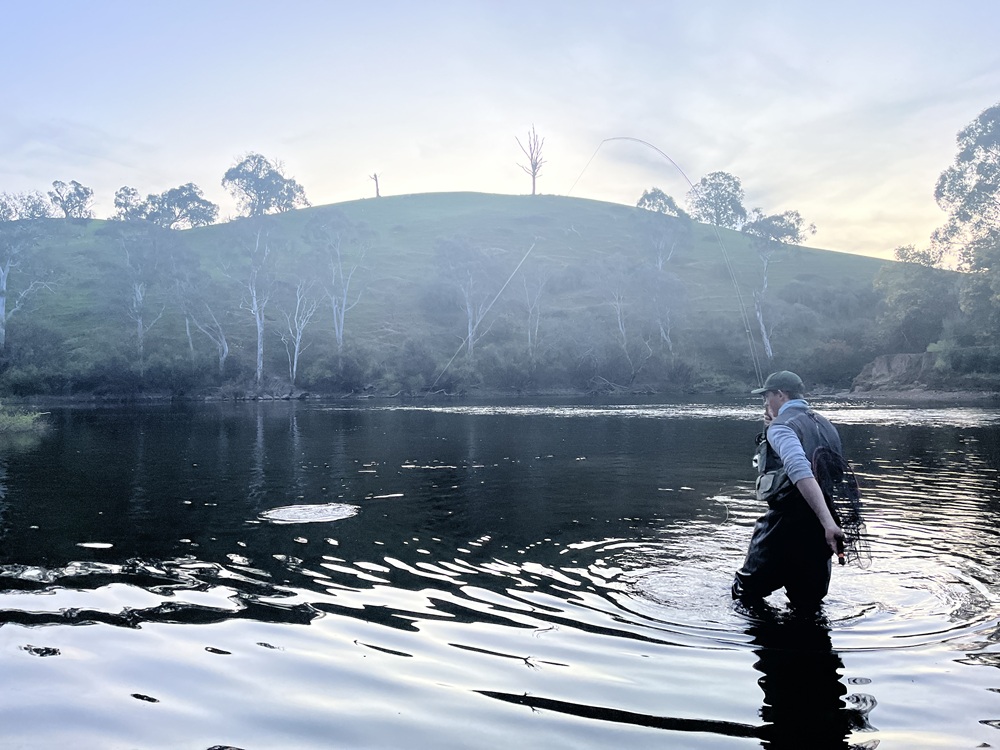
With the hook having already fallen out in the net, release is quick and easy - even in poor light with cold fingers.
When it comes to barbless versus barbed hooks on flies, I am firmly in the barbless camp to the point where I just can’t see the benefits of barbs to a competent flyfisher. I don’t write about it or think about or proselytise. However, a recent experience, recounted to our wise editor, led to him suggesting a short blog. So here goes.
On Friday 13th of June, I booked a boat on Chew Magna Reservoir near Bristol for a day’s fishing with my brother Rob, the lake being sort of central – a 2½ hour drive north for me, a 1½ hour drive south for Rob.
Well, I should have stayed in bed. Spending a summer in Cornwall with clients on the other side of the world, means I work odd hours. At 11.30pm on 12 June, my alarm went off for a short video conference with a PNG client. Pacific hours kicked in and we finally got the Zoom working at 1am, just in time for a short session before morning tea break. The business was more or less sorted by 3am, when I excused myself and went to get a few hours’ sleep before heading off to Chew. I’d set the alarm for 5.30, but turned it off, prepared to sacrifice an hour or two of fishing in favour of not being tired.
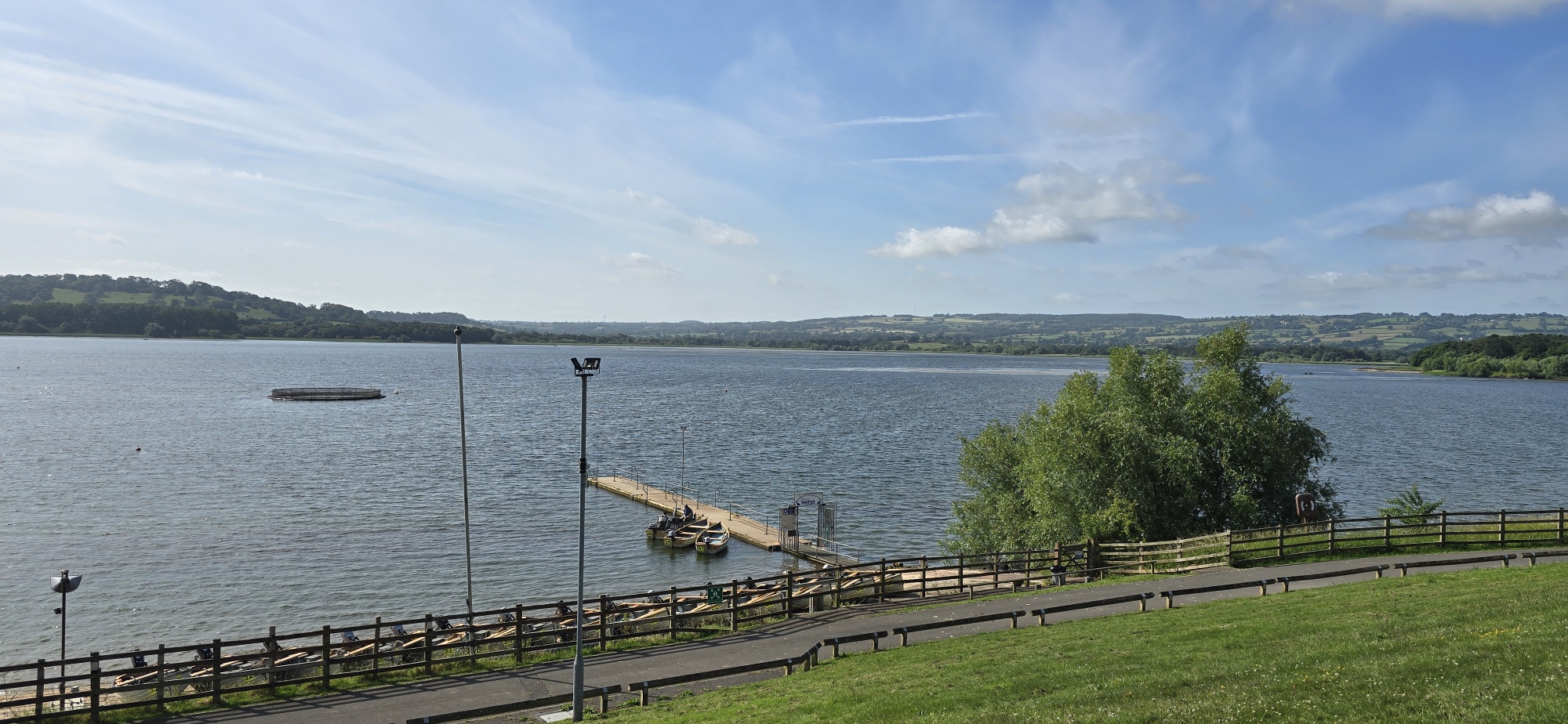
The ripple before the calm on Chew.
When I got to Chew it looked beautiful, although I already sensed the wind was dying, the skies were clearing, and it was going to be a warm, windless day. Chew doesn’t usually fish well in the doldrums so I was already thinking technical. I checked Rob’s progress and he was crossing the Severn Bridge so I had a bit of time to get everything properly set up.
When we finally started fishing, I deployed my new drogue. I don’t have a drogue in Cornwall, so I’d made one. My wife Kat donated one of her several hundred old canvass horse rugs (“they’ll come in handy one day”) which I attacked with scissors. Two lengths of batten to keep it apart, with 1 litre milk bottles on the top to keep it afloat, and a bit of rusty chain to sink the other end. And lots of rope and granny knots. Half an hour’s work, and bloody hell, it actually worked brilliantly!
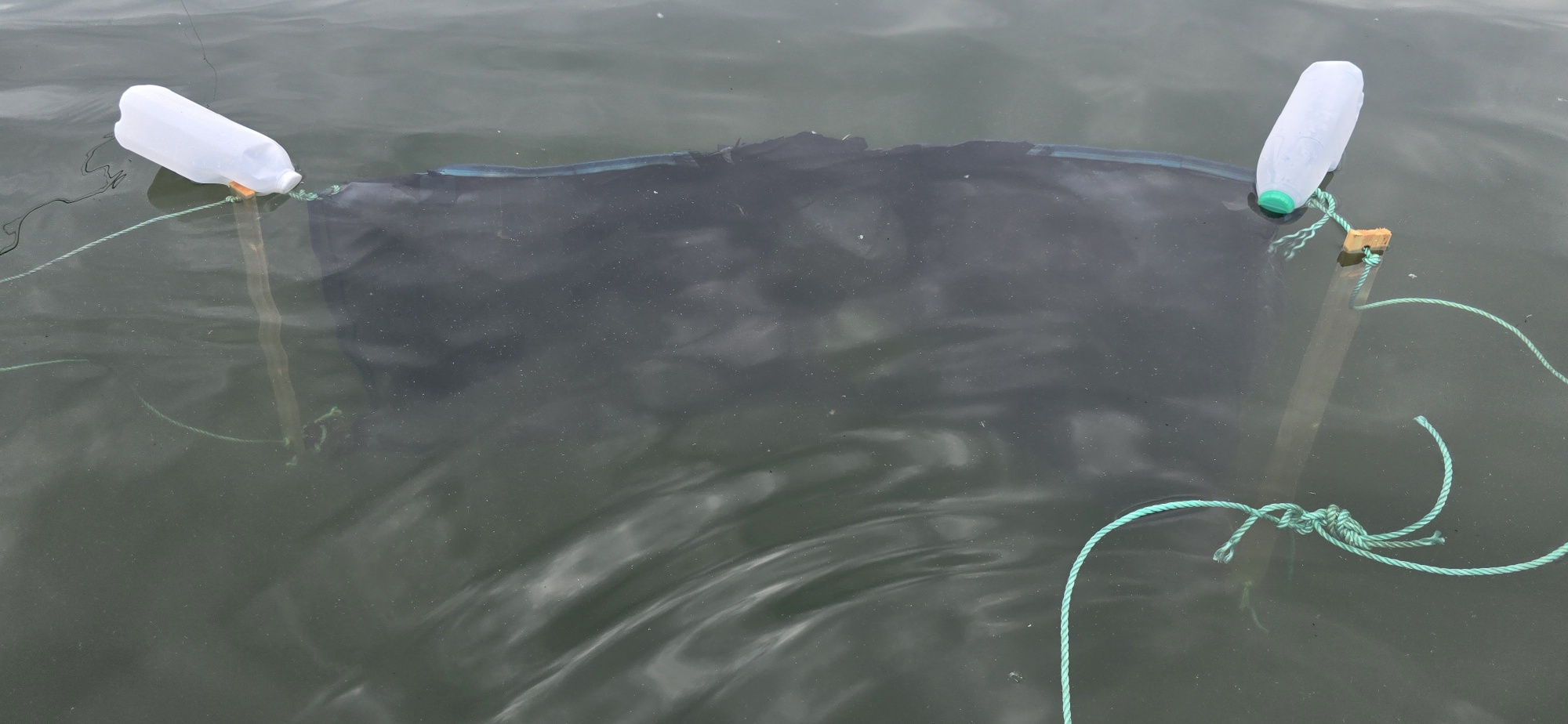
At least the drogue was a success!
But it didn’t help with the fishing once Rob arrived, as the wind died, and we became becalmed on the warm glassy water. Ten or so other boats bobbed around, and there was very little chatter. Over two hours, I saw two fish caught, and neither of them was on our boat. I changed flies, lines, techniques, and gave Rob regular casting tips: the only time he ever flyfishes is with me.
As I tied on a big dry for Rob, I remember thinking I should flatten the barb. But the thought of him actually hooking something and then losing it whilst he struggled with slack line, was too horrible. In the next hour I did have a couple of bumps, and I saw several boils – though rarely within casting distance. If there’d been a ripple, I wouldn’t have noticed most of them.
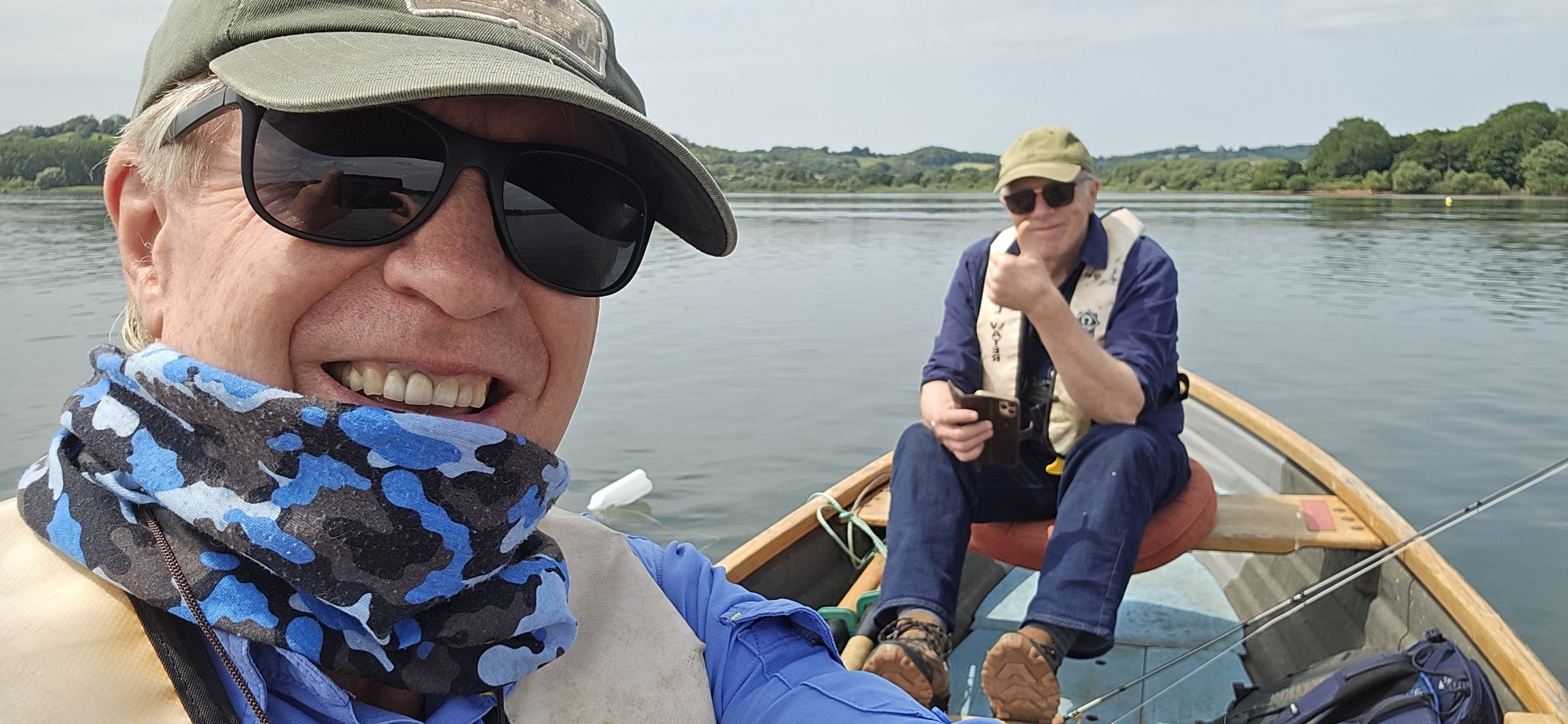
Not great fishing conditions, but good to be spending time with my brother.
I’d taken off my sunglasses to change the fly yet again, when thump, something smacked me in the face. I yelped and Rob swore an apology. I took my hand off my face, turned towards him and he swore again. I mumbled something about not casting through the boat, but there, in the inside corner of my lower eyelid was a size 10 Henneberry Hopper.
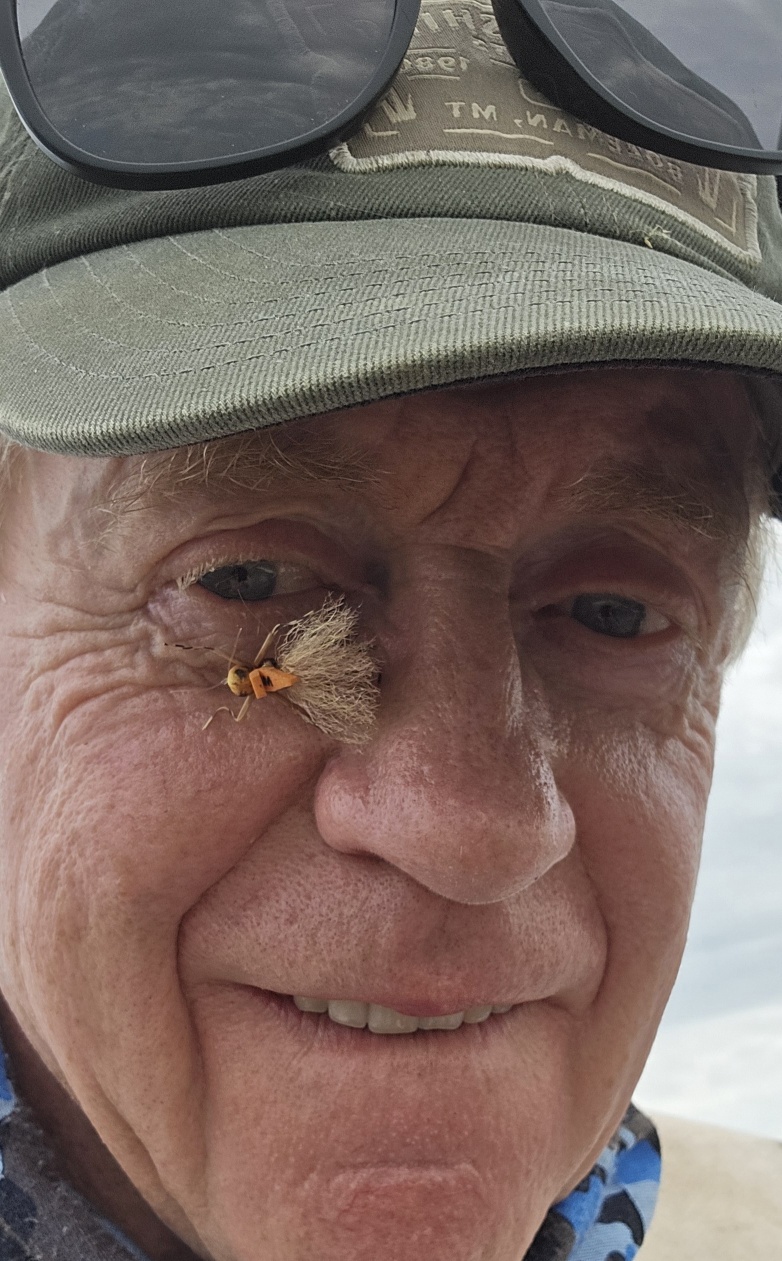
No more fishing.
And that was the end of the day’s fishing. I’ve pulled a lot of flies out of people over the years and know all the tricks, but I’m not daft enough to mess around with something barbed and actually in my eye socket. It didn’t hurt at all, even when I gave it a tentative wiggle to see if it would pop out, so we just packed up and headed to shore. Rob went home, north. I drove south to Taunton Hospital. An hour and twenty minutes Google said, but as I drove, Maps diverted me off the main road and the ETA got later and later. Soon enough, the traffic settled into a steady crawl. In the end it took two and a half hours. Parking was easy but as I made my way through the hospital, I got stuck for twenty minutes whilst the helicopter delivering two serious casualties landed – coming from the very crash that closed the motorway and extended my trip time. A good dose of perspective.
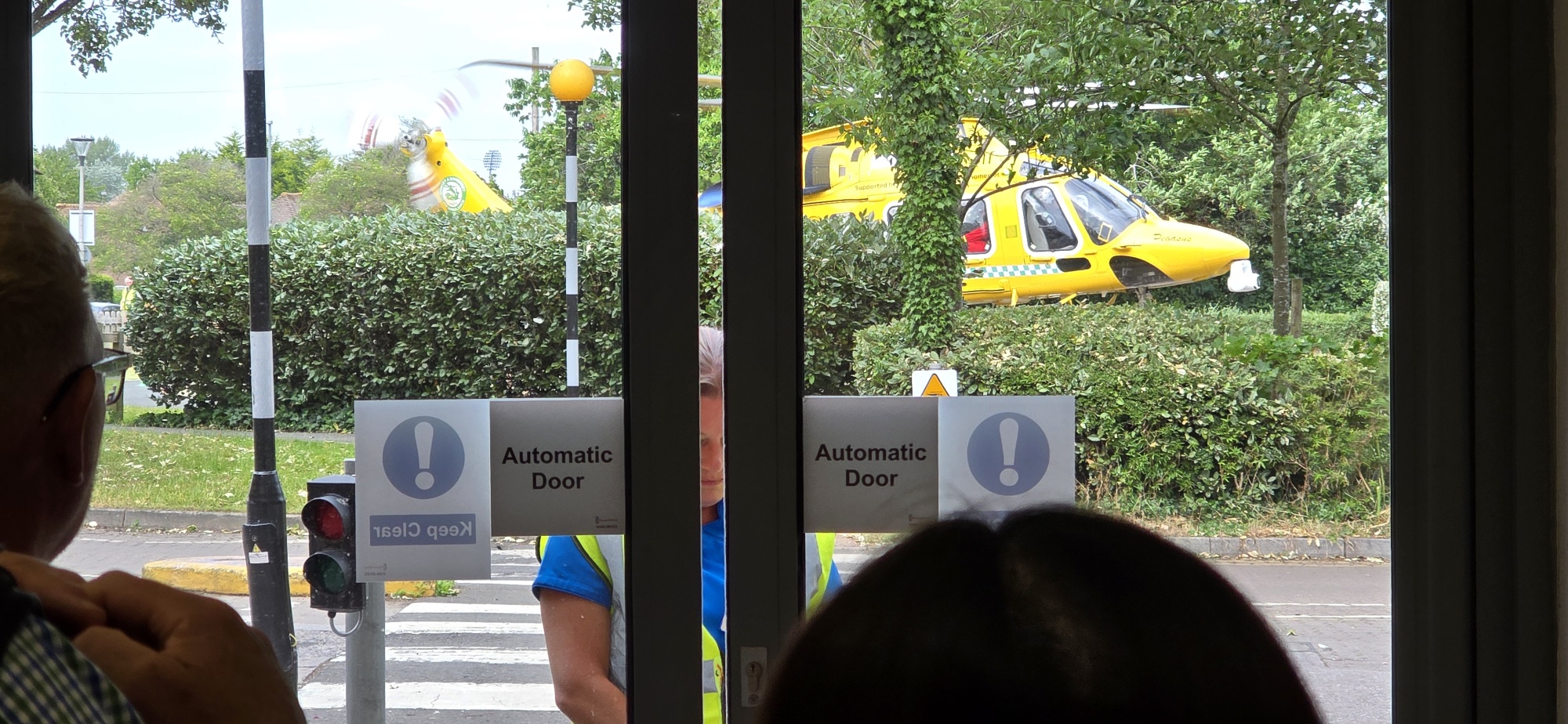
Perspective.
When I walked into the Emergency Department, with sunglass on, it was hectic. Standing room only. I was checked in, triaged, and the friendly admissions nurse remarked, “We see a lot of those, but never before in the eyelid.” She then said something about a specialist, followed by, “Take a seat.”
By now, lack of sleep, my injury, and time on the road were all beginning to take their toll, so I asked if I would have time to get a coffee? She responded in the affirmative, while someone behind me chuckled, “You’ll have time for a three course dinner, lovely!”
I did some email work, found all the puzzles I could do on the free version of the New York Times app, and fell asleep for a bit. After a while, I wondered whether maybe I’d missed my name while I was snoozing, so I wandered up and checked. I swear they couldn’t find me on the system, yet after a bit they said the specialist was on the way but had been delayed. It was over three hours when they finally called me.
The specialist was a lovely chap. He had a poke around and said, “Hang on, I need to get some tools”. Tools! He asked if he could push the point through, and did I want an anaesthetic? (His tone suggested that would be a bit of a nuisance, so I declined.) A tiny sting, “…keep your eye closed…”, and then a ping as the wire-cutters removed the hook point and barb, never to be seen again. “That’s it,” he said. “You can go.”
What’s the moral of the story? Well, apart from not going fishing when you’re tired, on Friday the 13th, and with your novice flyfishing brother, it’s to wear glasses. Sooner or later you will end up with a hook injury, but you do not want it anywhere near your eye.
Pros and cons
So, back to the pros and cons of barbless v barbed hooks.
Barbed hooks often hold better than barbless when there’s no tension, hence the concept. You can accidentally let the line go slack with a barbed hook and the fish will usually still be there when you pick it up again. If you’re fishing for food and killing everything you catch, in that respect at least, this may be a better hook to use.
However, for catch-and-release, barbless hooks cause less damage to fish than barbed hooks. And ironically, they often penetrate better because you don’t have to push past the barb when setting the hook. There is some discussion around barbless hooks causing deeper wounds because they move around during the fight, causing the wound to enlarge, but the balance of the science says that barbless hooks do much less damage to the fish, especially when deep hooked.
Barbless hooks are a lot easier and quicker to remove than barbed hooks. Any experienced angler will know the angst of trying to release a good fish on a barbed hook. And there is always that fish where the hook just will not come out, which usually means you have to cut the fly off and let the fish take its chances. Not a great outcome for angler or catch.
While the balance of the science suggests fish landing rates reduce significantly with barbless hooks for the inexperienced, if you’re a competent flyfisher, landing rates don’t really vary. I can’t measure the difference between barbed or not barbed if I keep the rod up and don’t let the line go slack. And pleasingly, 9 times out of 10, the hook will just drop out when the fish is in the net… which can actually improve your angling efficiency. If you don’t already, try, say, fishing the short-lived chaos of a good evening rise with barbless hooks – you’ll thank me!
Your fishing efficiency increases dramatically if you fish barbless during the time-critical, low light chaos of the evening rise.
If you are a competition flyfisher, barbless hooks are compulsory. Ditto if you are fishing in most designated catch-and-release or no kill areas. Basically, if you’re a catch-and-release fisher, and you want more of your fish to survive (presumably you do), then barbless hooks make sense.
Additionally, if you accidentally break off a fish during the fight, there’s a very good chance it will easily shed the hook – another plus for fish welfare.
(Another little bonus with barbless is that freeing flies from snags – above or below the water – is usually much more achievable.)
And in contrast to the earlier Friday the 13th story, if you inadvertently impale yourself with a barbless hook, it will just pull out backwards, or in most cases drop out. You can keep fishing without a trip to Emergency.
In conclusion….
If you are practicing catch-and-release, barbless hooks do less damage to fish than barbed hooks. That’s what the compelling balance of the science says.
If you play your fish competently, your landed fish rates shouldn’t vary.
If you are flyfishing with an inert fly, for example a static Booby, you should only ever use barbless because of the risks of deep hooking.
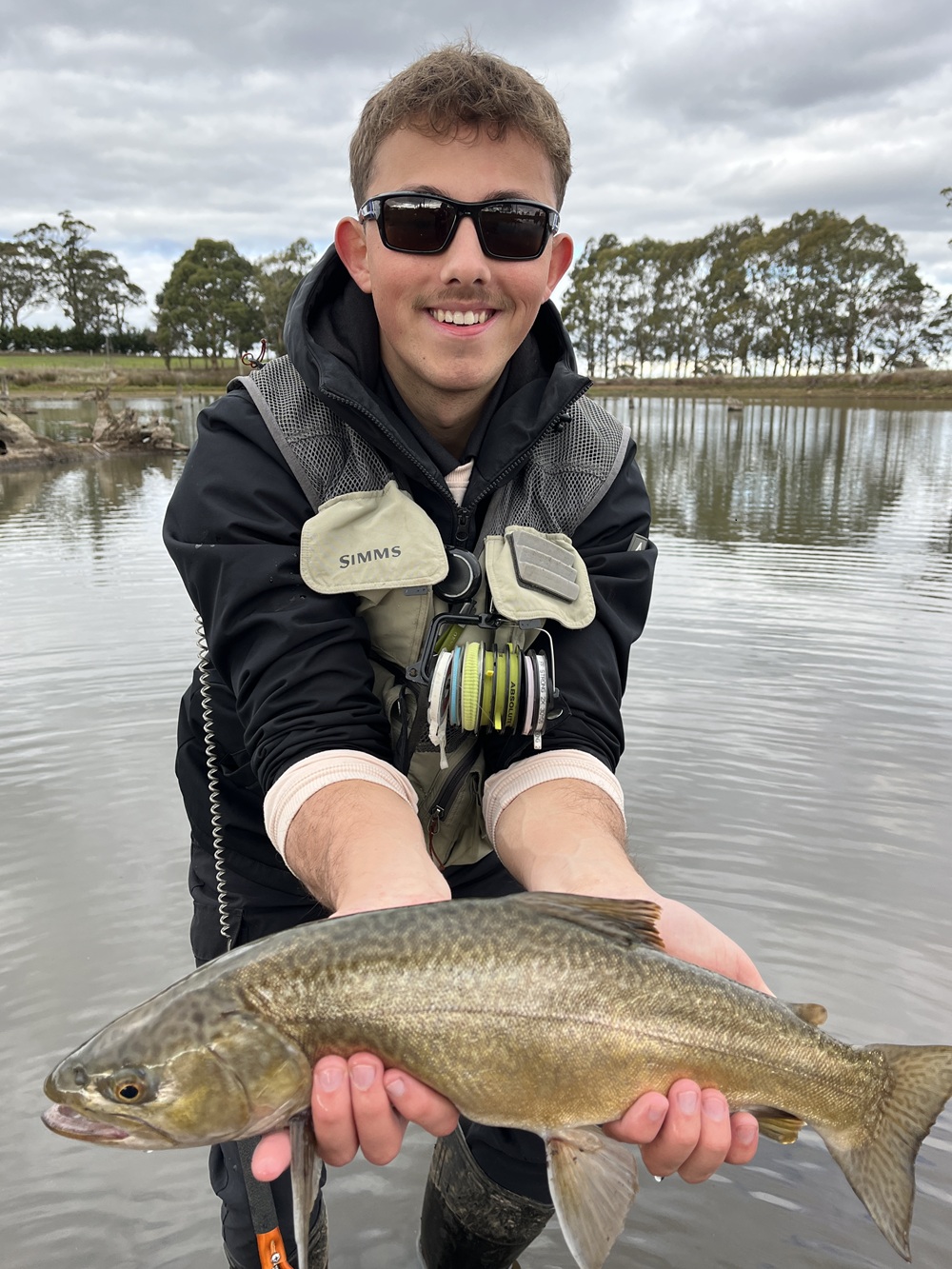
Always wearing polarised glasses will help your fishing anyway, even on cloudy days. Eye protection is a bonus.
And finally, always wear glasses when flyfishing to minimise the risk of eye injury. I haven’t said safety glasses and I don’t know whether good quality polarised glasses are safety rated, but if you have major concerns, please do your own research. Having an instinct to know when to abort a cast, for example after a gust of wind has blown the line across your body, is also useful.
Anyway, I’m thankful I still have two eyes, will be making even more effort to always fish barbless, and advocating for the same from my boat partner!









